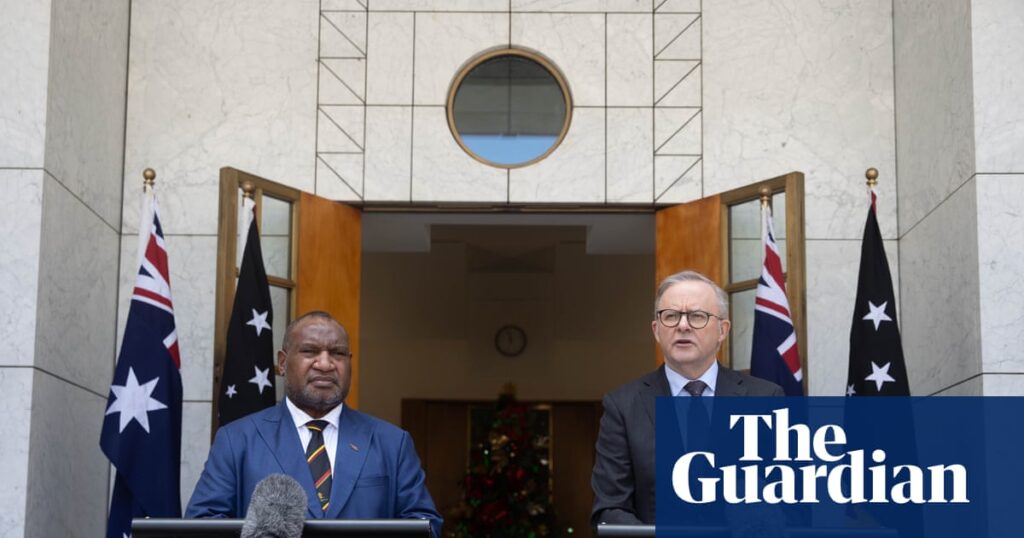
As Papua New Guinea (PNG) gears up to celebrate 50 years of independence next month, it is set to sign a significant defense treaty with Australia, reaffirming its ties with its former colonial ruler. This agreement will allow PNG nationals to gain Australian citizenship through service in its defense forces, enhance defense cooperation, and provide both nations’ militaries with greater access to each other’s bases.
“Our security and prosperity are entwined with their security and prosperity: this defense treaty will take that to an even higher level,” stated Pat Conroy, Australia’s Minister for Defense Industry and the Pacific, earlier this week. His PNG counterpart, Billy Joseph, emphasized the treaty’s message amid regional competition, asserting that “PNG stands with Australia.”
Regional Dynamics and Strategic Interests
The treaty is part of a broader geopolitical contest stretching across the Pacific, where major global powers vie for influence, access, and loyalty. For PNG, this represents both a delicate balancing act and an opportunity. The defense treaty with Australia is scheduled to be signed on September 15, just a day before PNG marks its 50th anniversary of independence from Australia.
Port Moresby insiders reveal that PNG was on the brink of signing a policing and security deal with China last year. However, Australia intervened with an enticing offer to fund a PNG team in Australia’s national rugby league competition. A source familiar with the situation described the diplomatic maneuvering as a “diplomatic knife fight,” highlighting the intense and ongoing nature of the regional power struggle.
“If it had been a footy match, it was pretty much close to full-time and coming down to the wire,” the source told The Guardian.
The Role of Soft Power and Economic Incentives
Rugby league, PNG’s national sport, played a pivotal role in swaying the decision. The opportunity to compete in Australia’s premier league was irresistible, even with the stipulation that PNG could not enter a security or military agreement with China. Australia’s $600 million investment over a decade to support the new Port Moresby team is contingent upon PNG not engaging in security agreements with nations outside the ‘Pacific family,’ a term often used to exclude China.
Conroy highlighted the rugby league deal as a unique offering from Australia, using it as a tool of soft power diplomacy to strengthen ties with PNG. “We are using rugby league as a tool of soft power diplomacy to bring our two countries closer together,” he said in a recent speech in Brisbane.
China’s Influence and PNG’s Diplomatic Balancing Act
China’s presence in PNG is significant, with investments in infrastructure, including stadiums, highways, and universities. PNG was the first Pacific nation to join Beijing’s Belt and Road Initiative, and China has provided concessional loans for critical infrastructure projects.
Across the Pacific, China’s influence is evident, contrasting with a perceived decline in the U.S.’s historical presence. In response, Washington has sought to re-establish its influence by opening or reopening embassies in several Pacific nations. The U.S. and Australia have jointly contributed to a $500 million upgrade of the Lombrum naval base on Manus Island, enhancing strategic access for both navies.
PNG’s Defense Minister, Billy Joseph, has been clear about the country’s security alliances, stating, “when it comes to security, we choose our traditional partners, which is Australia and the US.” However, PNG’s diplomacy remains a balancing act, as it seeks to maintain Chinese investment in infrastructure and development projects.
Domestic Concerns and Future Implications
Prime Minister James Marape has adeptly leveraged foreign interest to secure investments for PNG’s development, addressing issues such as corruption, climate change adaptation, and fragile health and education systems. While Marape emphasizes the foreign policy principle of “friends to all, enemies to none,” the growing U.S.-China rivalry may challenge this stance.
“We will not compromise our relations with China just as much as we will not compromise our relations with the USA,” Marape told a university audience in Canberra.
Patrick Kaiku, a teaching fellow at the University of Papua New Guinea, notes that while foreign policy rivalry is a priority for PNG’s political elite, it does not dominate the daily lives of most Papua New Guineans. Instead, fundamental concerns like security, healthcare, and education are paramount.
Kaiku argues that PNG should assert its influence by focusing on non-traditional security issues such as climate change and food security. He sees Marape’s diplomacy as a strategic move to benefit both the nation and his political standing. However, as the geopolitical contest intensifies, PNG may face increasing pressure to choose sides.
“It’s a rhetoric. It’s very idealistic. But in the real world of realpolitik, it may not work,” Kaiku cautions.
As PNG navigates its complex geopolitical landscape, the implications of its defense treaty with Australia and its broader diplomatic strategy will continue to shape the region’s future.







